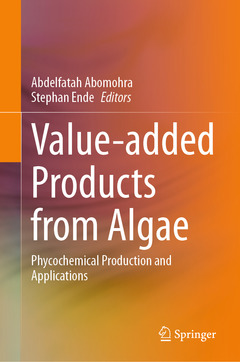Value-added Products from Algae, 1st ed. 2024 Phycochemical Production and Applications
Coordonnateurs : Abomohra Abdelfatah, Ende Stephan

This book provides a comprehensive overview of value-added products from algae, presenting the fundamentals of algal cultivation, metabolism, harvest, and cellular pathways of phycochemicals biosynthesis. It offers sufficient details for both experts and non-experts to grasp the recent progress in this field. The book also discusses new phycochemicals and advancements in technology development, from separation to scale-up commercialization.
Divided into 18 chapters, the book begins with an introduction to the value of algae as a renewable resource, followed by an authoritative overview of topics such as algae cultivation systems, harvesting techniques, phycochemical analysis, artificial intelligence in phytochemical recognition, and bioprocess engineering. Additional chapters cover various aspects of algal biotechnology, including biorefinery technology, biofuel-integrated routes, and the use of wastewater for algal growth. The book also explores high throughput screening methods for microalgae-based phycochemicals and examines the catalytic processes involved in algal bioprocessing. Cutting-edge topics such as omics approaches for algal applications, algal-based biopolymers, diatom nanostructured biosilica, and the potential of seaweeds in methane emission mitigation, are also explored. In this book, readers will discover the recent technological applications of algae in aquaculture and will find a case study on the functional food potential of Spirulina. Recognizing the importance of legislation and biosecurity in the field, the last chapter of the book addresses the regulatory frameworks and biosecurity measures necessary for the safe and sustainable development of algal biotechnology.
Given its breadth, the book is a valuable resource for scholars, researchers and professionals interested in algal biotechnology, sustainability, biomass conversion, and new algal products from any perspective.
Chapter 1: Opening the algal gateway……………………………………..
Stephan Ende, Abdelfatah Abomohra
Chapter 2: Algae cultivation systems……………………………………..
Wafaa F. Zohir, Mofida E. M. Makhlof, Ahmed M. Abdallah , Mostafa M. El-Sheekh
Chapter 3: Algae Harvesting………………………………………………..
Benjamin Bernard Uzoejinwa, Felix Uzochukwu AsoiroChapter 4: Phycochemicals ………………………………………………….
Mahdy Elsayed, Mohamed Eraky, Shah Faisal, Jing Wang
Chapter 5: Artificial intelligence in phytochemicals recognition………….
Anja Dullius, Giseli Buffon, Milton Faria Junior, Silvana Giuliatti
Chapter 6: Overview of Bioprocess Engineering……………………………
Richard D. Ashby, Joseph Msanne, Mamoona Munir, Abrar Inayat, Carlo Pastore, Ahmad Mustafa
Chapter 7: Overview of biorefinery technology……………………………
Benjamin Bernard Uzoejinwa, Oji Achuka Nwoke, Felix Uzochukwu Asoiro, Chukwuemeka Jude Ohagwu
Chapter 8: Biofuel-Integrated Routes……………………………………….
Chukwuemeka Samson Ahamefule, Chidimma Osilo, Blessing C. Ahamefule, James C. Ogbonna
Chapter 9: The use of wastewater for algal growth………………………
Wei Han Foo, Sherlyn Sze Ning Koay, Hooi Ren Lim, Kit Wayne Chew
Chapter 10: High throughput screening to accelerate microalgae-based phycochemicals……………………………………………………………….
Juliane Wolf, Robert Chapman, Charu Deepika, Mélanie Pietri, Sakina Bensalem, Ben Hankamer
Chapter 11: Catalyst in action………………………………………………..
Sivakumar Esakkimuthu, Shuang Wang, Abdelfatah Abomohra
Chapter 12: Omics approaches for algal applications………………………
Shah Faisal, Dhara Dixit, Mahdy Elsayed, Durga Prasad Behera
Chapter 13: Algal-based Biopolymers………………………………………..
Samer Younes, Nathanael Arnold, Michael Paper, Linda Keil, Dania Awad, Thomas Brueck
Chapter 14: Diatom Nanostructured Biosilica………………………………
Mohamed Ghobara, Mostafa El-Sheekh, Adel F. Hamed, Mohamed A. A. Abdelhamid, Seung P. Pack
Chapter 15: Potential of Seaweeds to Mitigate Methane Emissions ………
Sophie Leonie Steinhausen, Abdelfatah Abomohra, Dieter Hanelt
Chapter 16: Algae for Aquaculture Recent Technological Applications ….
Mostafa Elshobary, Mohamed Ashour
Chapter 17: Algae as a functional food: A case study on Spirulina………
Agnese Stunda-Zujeva, Megija Berele
Chapter 18: Legislation and Biosecurity……………………………………..
Fernanda de Noronha Sertori, Gilvana Scoculi de Lira, Beatriz Jacob Furlan, Paulo Alexandre Silveira da Silva, Allana Rachel Dias, Michelle Aparecida Coelho Moreira
Abdelfatah Abomohra is a Researcher at the University of Hamburg, Germany. His research group is primarily working on value-added products and biofuel production from different biomass feedstocks, with a special focus on algal biotechnology. With 150+ articles published, he was nominated among the World’s Top 2% of Scientists List published in 2020-2023 by Stanford University and updated by Elsevier.
Stephan Ende is a Scientist at the Alfred Wegener Institute, Helmholtz Centre for Polar and Marine Research, Germany. His main research interests include Microalgae cultivation; Integrated Multitrophic Aquaculture; Recirculating Aquaculture Systems; fish nutrition, and he has been devoting his attention to the industrial applications of value-added products of algae.
Presents phycochemicals as value-added products from algae
Discusses zero-waste algal biorefineries and industrial applications
Covers algae cultivation and biochemistry of algal cells
Date de parution : 12-2023
Ouvrage de 612 p.
15.5x23.5 cm
Disponible chez l'éditeur (délai d'approvisionnement : 15 jours).
Prix indicatif 232,09 €
Ajouter au panierThèmes de Value-added Products from Algae :
Mots-clés :
Value-added products from algal biomass; Microalgae; Seaweeds; Algae cultivation systems; Phycochemicals; Algal biotechnology; Zero-waste algal biorefineries; Algae-mediated carbon dioxide sequestration; Biofuels; Dried algae in space missions; AI-based algal bioactive compounds discovery; Scale-up production of algae-based value compounds



